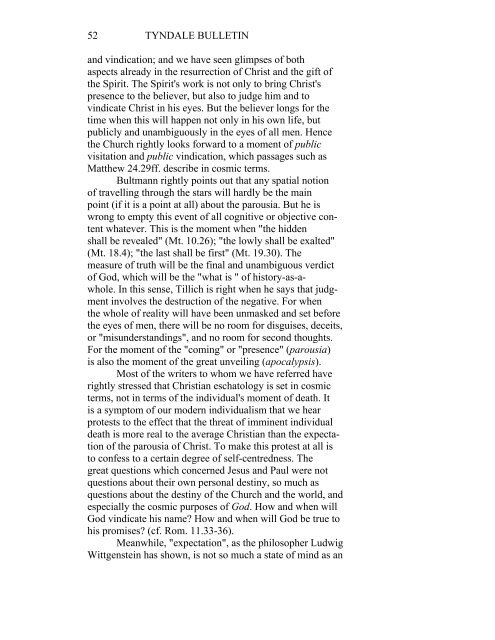the parousia in modern theology: some questions ... - Tyndale House
the parousia in modern theology: some questions ... - Tyndale House
the parousia in modern theology: some questions ... - Tyndale House
You also want an ePaper? Increase the reach of your titles
YUMPU automatically turns print PDFs into web optimized ePapers that Google loves.
52 TYNDALE BULLETIN<br />
and v<strong>in</strong>dication; and we have seen glimpses of both<br />
aspects already <strong>in</strong> <strong>the</strong> resurrection of Christ and <strong>the</strong> gift of<br />
<strong>the</strong> Spirit. The Spirit's work is not only to br<strong>in</strong>g Christ's<br />
presence to <strong>the</strong> believer, but also to judge him and to<br />
v<strong>in</strong>dicate Christ <strong>in</strong> his eyes. But <strong>the</strong> believer longs for <strong>the</strong><br />
time when this will happen not only <strong>in</strong> his own life, but<br />
publicly and unambiguously <strong>in</strong> <strong>the</strong> eyes of all men. Hence<br />
<strong>the</strong> Church rightly looks forward to a moment of public<br />
visitation and public v<strong>in</strong>dication, which passages such as<br />
Mat<strong>the</strong>w 24.29ff. describe <strong>in</strong> cosmic terms.<br />
Bultmann rightly po<strong>in</strong>ts out that any spatial notion<br />
of travell<strong>in</strong>g through <strong>the</strong> stars will hardly be <strong>the</strong> ma<strong>in</strong><br />
po<strong>in</strong>t (if it is a po<strong>in</strong>t at all) about <strong>the</strong> <strong>parousia</strong>. But he is<br />
wrong to empty this event of all cognitive or objective con-<br />
tent whatever. This is <strong>the</strong> moment when "<strong>the</strong> hidden<br />
shall be revealed" (Mt. 10.26); "<strong>the</strong> lowly shall be exalted"<br />
(Mt. 18.4); "<strong>the</strong> last shall be first" (Mt. 19.30). The<br />
measure of truth will be <strong>the</strong> f<strong>in</strong>al and unambiguous verdict<br />
of God, which will be <strong>the</strong> "what is " of history-as-a-<br />
whole. In this sense, Tillich is right when he says that judg-<br />
ment <strong>in</strong>volves <strong>the</strong> destruction of <strong>the</strong> negative. For when<br />
<strong>the</strong> whole of reality will have been unmasked and set before<br />
<strong>the</strong> eyes of men, <strong>the</strong>re will be no room for disguises, deceits,<br />
or "misunderstand<strong>in</strong>gs", and no room for second thoughts.<br />
For <strong>the</strong> moment of <strong>the</strong> "com<strong>in</strong>g" or "presence" (<strong>parousia</strong>)<br />
is also <strong>the</strong> moment of <strong>the</strong> great unveil<strong>in</strong>g (apocalypsis).<br />
Most of <strong>the</strong> writers to whom we have referred have<br />
rightly stressed that Christian eschatology is set <strong>in</strong> cosmic<br />
terms, not <strong>in</strong> terms of <strong>the</strong> <strong>in</strong>dividual's moment of death. It<br />
is a symptom of our <strong>modern</strong> <strong>in</strong>dividualism that we hear<br />
protests to <strong>the</strong> effect that <strong>the</strong> threat of imm<strong>in</strong>ent <strong>in</strong>dividual<br />
death is more real to <strong>the</strong> average Christian than <strong>the</strong> expecta-<br />
tion of <strong>the</strong> <strong>parousia</strong> of Christ. To make this protest at all is<br />
to confess to a certa<strong>in</strong> degree of self-centredness. The<br />
great <strong>questions</strong> which concerned Jesus and Paul were not<br />
<strong>questions</strong> about <strong>the</strong>ir own personal dest<strong>in</strong>y, so much as<br />
<strong>questions</strong> about <strong>the</strong> dest<strong>in</strong>y of <strong>the</strong> Church and <strong>the</strong> world, and<br />
especially <strong>the</strong> cosmic purposes of God. How and when will<br />
God v<strong>in</strong>dicate his name? How and when will God be true to<br />
his promises? (cf. Rom. 11.33-36).<br />
Meanwhile, "expectation", as <strong>the</strong> philosopher Ludwig<br />
Wittgenste<strong>in</strong> has shown, is not so much a state of m<strong>in</strong>d as an

















